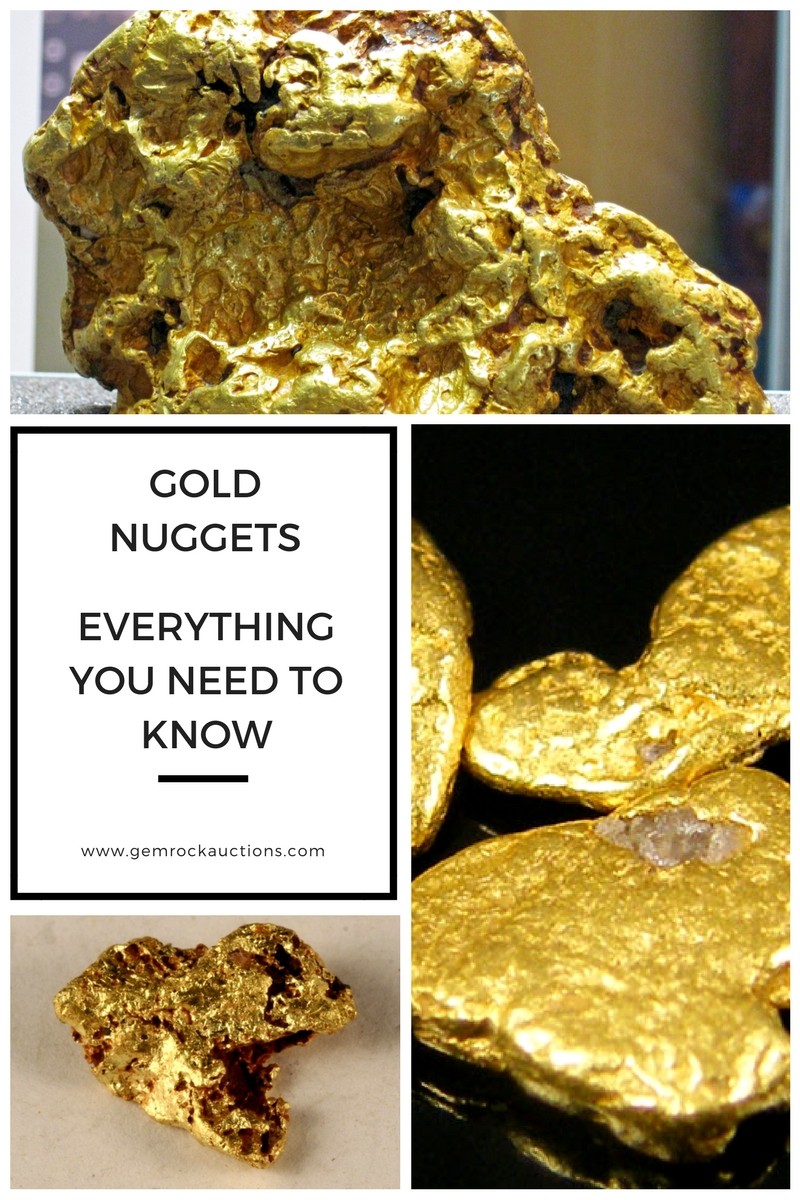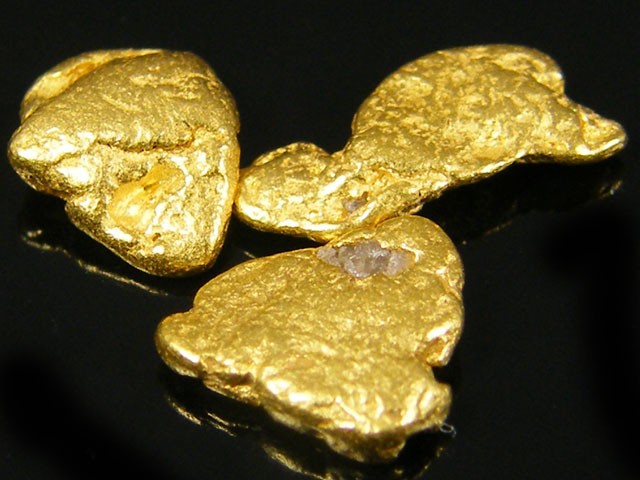
Gold Nuggets - Everything You Need To Know
 Gold nuggets are the ultimate collector’s piece. With their unique shape, surprising weight and Gold content, they represent something that is extremely rare and valuable that has been created by nature. This article will explore the different types of Gold nuggets as well as how they are formed.
Gold nuggets are the ultimate collector’s piece. With their unique shape, surprising weight and Gold content, they represent something that is extremely rare and valuable that has been created by nature. This article will explore the different types of Gold nuggets as well as how they are formed.
How Are Gold Nuggets Formed?
You may have a lot of questions regarding Gold nuggets. One of the most common questions that people may have is how these nuggets are formed. Gold nuggets are created by molten Gold that is liquid and seeps through fissures and cracks of host rocks. This is not unlike the process of how many other gemstones are created. It is important to know that these rocks are not pure Gold, as sometimes these can have Copper, Silver, or on a rarer basis, Palladium. These mixtures are created in a process know as hypogene. This entire process actually takes place under pressure within the earth’s crust. In some cases, you may even see pockets or holes when this was formed against bedrock.
Alluvial Gold
Alluvial Gold goes through a process where it is tumbled and then smoothed out. This is generally to a screen size of between 10 and 14. These types of Gold quartz rocks are very popular. There are Australian Gold nuggets that are generally a lot larger than the types of nuggets that you will find in the United States and Canadian Gold fields.
Biggest Gold Nugget Ever Found
Australia is a place that has a reputation for having the largest Gold nugget in the entire world. Known as the ‘Welcome Stranger’, it weighs around 158 pounds or around 2316 ounces of Gold.

Gold Nugget Rarity
These days Gold is not typically mined as nuggets anymore, rather they are found in Gold ore with only trace amounts of the Gold within the quartz, which is the host rock. This ore is then crushed as a way to release any Gold from inside the quartz. This extraction is made easy as Gold has a specific gravity of around 19.3, making it the heaviest metal.
Gold Properties
There are a lot of interesting things about Gold that you may not be familiar with. Gold is a unique metal as it is both malleable and impressionable. Gold is primarily available in a bright and brilliant yellow, meaning that it has a high level of patina. Along with Caesium and Copper, this is one of the few metals that are not white-tinted.

Gold Color
Gold is available in brilliant yellow, which has a high patina. Separately from Copper and Caesium, it is the only non-white tinted metal. Gold’s beautiful warm color has led to its extensive use in ornaments.
With the addition of impurities, Gold can vary in color to include pink, reds and even purple. Copper generates a pink color in Gold. The more the copper, the darker the color of the Gold will be.
Gold Sources
Other primary manufacturers of this metal are Australia, China, Russia, Canada and the USA. In the USA, 2/3rds of their Gold is mined in California, Alaska, Nevada and the famous Yukon Gold nuggets. Also, South Dakota generates a massive amount of Gold.
Victorian nuggets from Australia, especially Bendigo Gold nuggets, are considered rich in Gold, which consists of at least 95% Gold. The rest is principally composed of dissolved Silver in the Gold. The structure of the nuggets is quite comparable to the composition of the Gold which originated directly from the quartz reefs.

Kalgoorlie in Western Australia still produces Gold in large mining operations and Kalgoorlie Gold nuggets are popular for their larger sizes.
In fact the ‘Welcome Stranger’’ which was discovered along in Moliagul, Victoria, Australia in 1869, is the largest recognized nugget, which contains 2300 ounces of Gold. Also, “The Welcome” (Bakery Hill) at Ballarat in 1858, compromised of 2200 ounces. The 1743’s ounce (Blanche Barkly), which was discovered at Kingower in 1857, then, the 1600‘s ounce (Precious) was found near Rheola since 1871.
Also, the 1110’s ounce (Viscount Canterbury) was found in 1871. During the 20th century, the biggest Gold nugget was found with a metal detector, which contained 870 ounces at Kingower in 1980. Because most rivers cleanse out large nuggets like these, pushing them downstream it doesn’t always been that there is a major Gold vein close by. It could have come from far up the river.
Chemical Composition

Holistic Aspect
While Gold is commonly used in jewelry for its beauty, it turns out there may be emotional benefits to wearing this metal as well. It gives off a feeling of prosperity and helps the wearer to appear wealthy. It can cause a person to feel more innovative while also serving as a balancer and stabilizer. Gold is also a very comforting metal that allows a person to free themselves from weakness and worry. It can cause a cleanliness of spirit, giving a lot of energy that can help improve your quality of life through improving your physical and spiritual well-being. In addition to being great for wearing, Gold is also a great investment that can help protect your investments in the future.
Gold is a metal that offers a lot of versatility. It can be used in jewelry, as part of your investment portfolio and even in your home decor. Gold is quite precious and stunning and really adds a special something to anything it is added to.
SHOP FOR GOLD NUGGETS
Search the Gemstone Encyclopedia
Related Auctions
Related Articles
Everyone has a gemstone that corresponds with their star sign. These are also known as your Star Stone. Learn more about these stones and find out what your Star Stone is.
10th May 2018
Originally the Birthstones or gemstones were associated with a zodiac sign or the month of a individuals birth. Find out what your stone is and view the stones we have for sale
8th Feb 2021
There are so many tools on the market for testing a gemstone, but what are the main tools required for simple analysis. Lets look at four tools for gemstone testing.
4th Mar 2020
Latest Articles
Yugawaralite is a rare colorless, white, or pinkish zeolite crystal named for its discovery in Yugawara, Japan. Here we uncover the multifaceted history, properties, prices, and uses of yugawaralite.
24th Mar 2025
Simpsonite is a lesser-known mineral known on the gem market for its durability, yellow-orange color, and rarity. Discover all the properties, uses, prices, and history of simpsonite.
3rd Mar 2025
Kurnakovite is a colorless crystal related to inderite and rarely faceted but known among collectors. Explore the mineral traits, history, prices, and more in this kurnakovite guide.
17th Feb 2025
Article Categories
How To's is where you will find helpful articles from gem Rock Auctions on how to cut gemstones, select gemstones and buy gemstones.
9 Articles





